Breast Cancer Case Study: Australian Health Services Evaluation
VerifiedAdded on 2023/03/17
|7
|1561
|34
Case Study
AI Summary
This case study focuses on a 45-year-old overweight woman named Jade, diagnosed with early-stage breast cancer. The assignment analyzes the health issue, exploring the biomedical, behavioral, social, and environmental determinants contributing to her condition. It examines Jade's lifestyle, including her smoking, alcohol consumption, and family history, as key risk factors. The case study then assesses the adequacy of services available within the Australian healthcare system, including Breast Cancer Care WA and Breast Cancer Network of Australia, and the preventive approach of BreastScreen Australia. It highlights the need for a personalized treatment approach for Jade and emphasizes the importance of community education and investment in infrastructure to address the rising prevalence of breast cancer. The analysis incorporates epidemiological data and research to support the findings and recommendations.
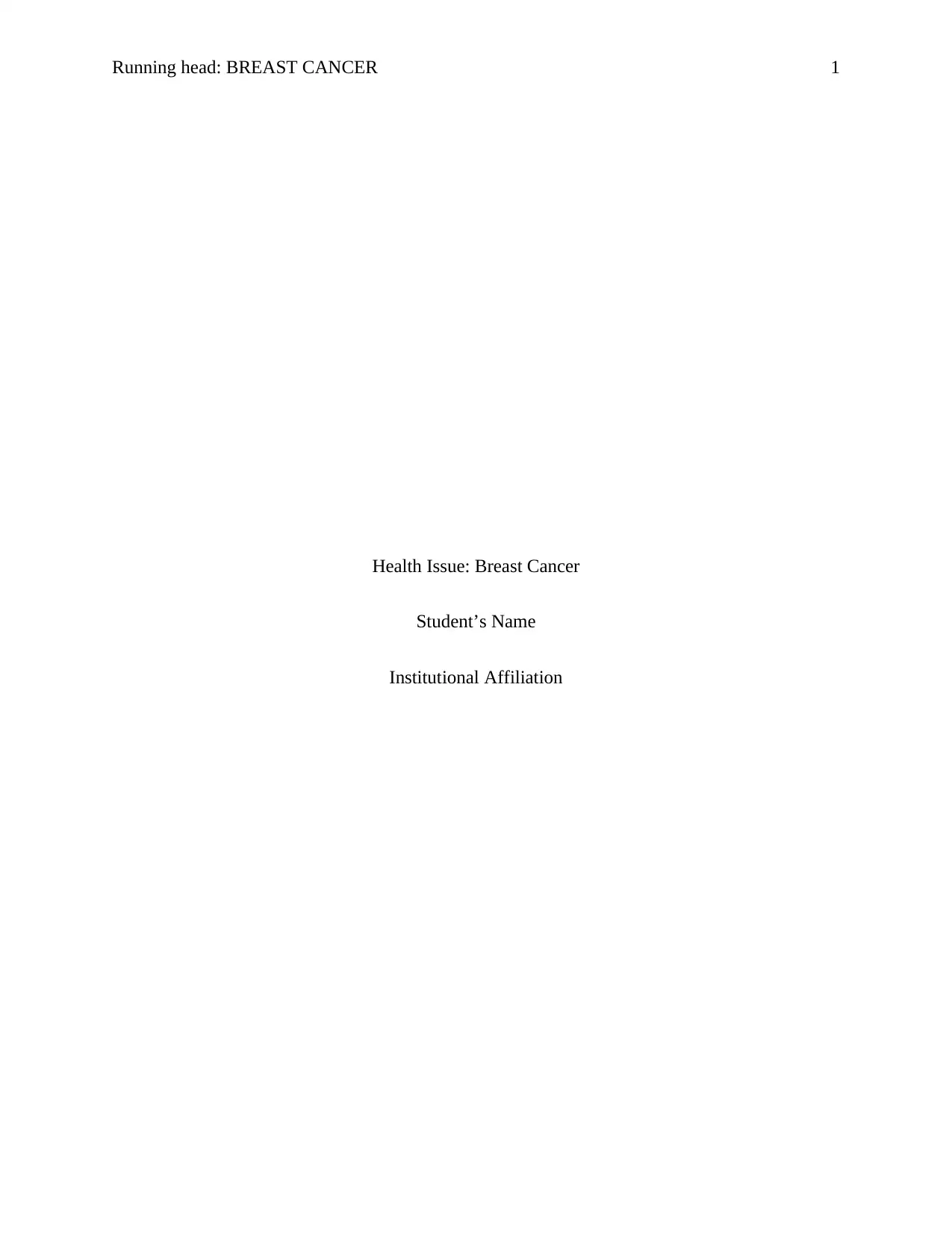
Running head: BREAST CANCER 1
Health Issue: Breast Cancer
Student’s Name
Institutional Affiliation
Health Issue: Breast Cancer
Student’s Name
Institutional Affiliation
Paraphrase This Document
Need a fresh take? Get an instant paraphrase of this document with our AI Paraphraser
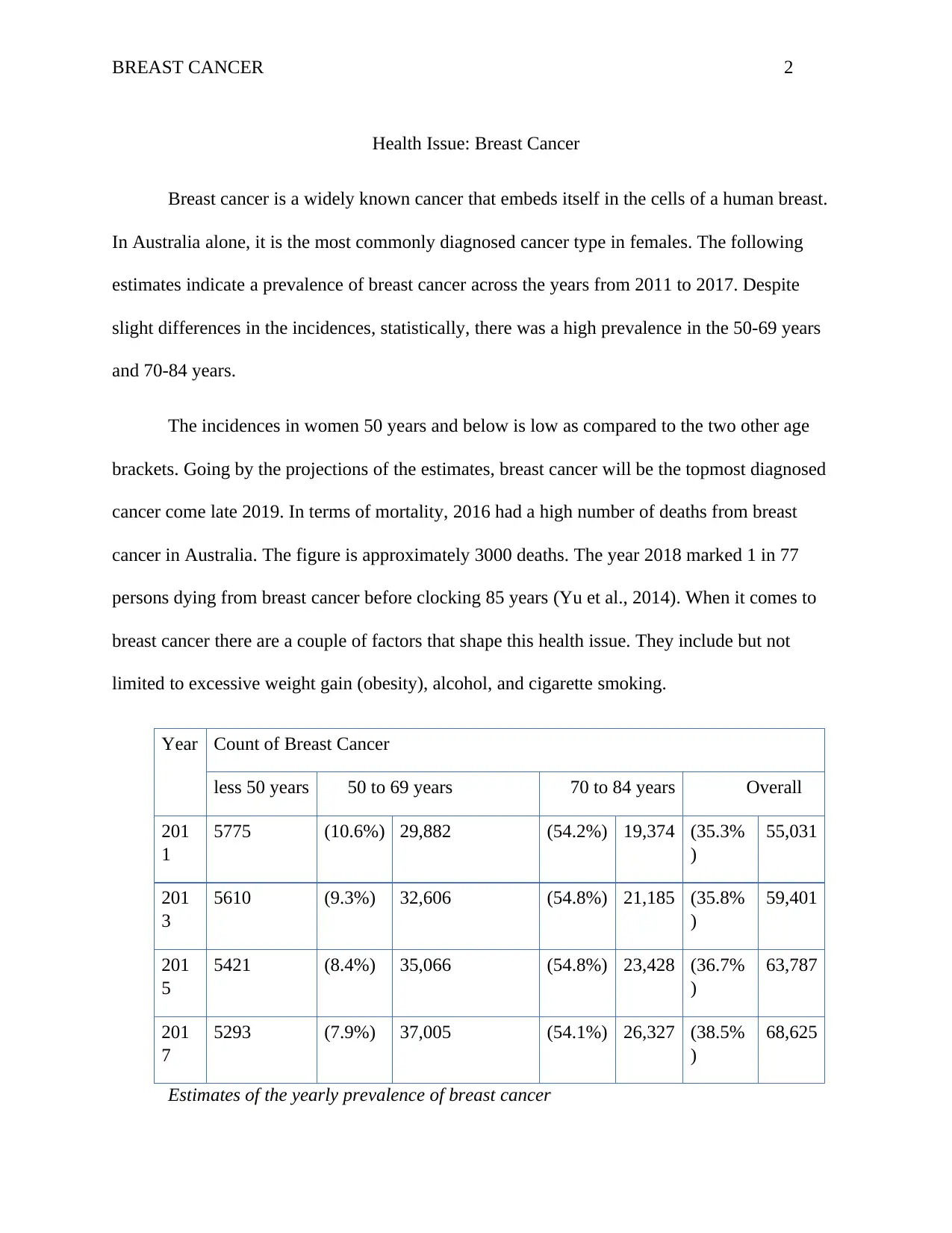
BREAST CANCER 2
Health Issue: Breast Cancer
Breast cancer is a widely known cancer that embeds itself in the cells of a human breast.
In Australia alone, it is the most commonly diagnosed cancer type in females. The following
estimates indicate a prevalence of breast cancer across the years from 2011 to 2017. Despite
slight differences in the incidences, statistically, there was a high prevalence in the 50-69 years
and 70-84 years.
The incidences in women 50 years and below is low as compared to the two other age
brackets. Going by the projections of the estimates, breast cancer will be the topmost diagnosed
cancer come late 2019. In terms of mortality, 2016 had a high number of deaths from breast
cancer in Australia. The figure is approximately 3000 deaths. The year 2018 marked 1 in 77
persons dying from breast cancer before clocking 85 years (Yu et al., 2014). When it comes to
breast cancer there are a couple of factors that shape this health issue. They include but not
limited to excessive weight gain (obesity), alcohol, and cigarette smoking.
Year Count of Breast Cancer
less 50 years 50 to 69 years 70 to 84 years Overall
201
1
5775 (10.6%) 29,882 (54.2%) 19,374 (35.3%
)
55,031
201
3
5610 (9.3%) 32,606 (54.8%) 21,185 (35.8%
)
59,401
201
5
5421 (8.4%) 35,066 (54.8%) 23,428 (36.7%
)
63,787
201
7
5293 (7.9%) 37,005 (54.1%) 26,327 (38.5%
)
68,625
Estimates of the yearly prevalence of breast cancer
Health Issue: Breast Cancer
Breast cancer is a widely known cancer that embeds itself in the cells of a human breast.
In Australia alone, it is the most commonly diagnosed cancer type in females. The following
estimates indicate a prevalence of breast cancer across the years from 2011 to 2017. Despite
slight differences in the incidences, statistically, there was a high prevalence in the 50-69 years
and 70-84 years.
The incidences in women 50 years and below is low as compared to the two other age
brackets. Going by the projections of the estimates, breast cancer will be the topmost diagnosed
cancer come late 2019. In terms of mortality, 2016 had a high number of deaths from breast
cancer in Australia. The figure is approximately 3000 deaths. The year 2018 marked 1 in 77
persons dying from breast cancer before clocking 85 years (Yu et al., 2014). When it comes to
breast cancer there are a couple of factors that shape this health issue. They include but not
limited to excessive weight gain (obesity), alcohol, and cigarette smoking.
Year Count of Breast Cancer
less 50 years 50 to 69 years 70 to 84 years Overall
201
1
5775 (10.6%) 29,882 (54.2%) 19,374 (35.3%
)
55,031
201
3
5610 (9.3%) 32,606 (54.8%) 21,185 (35.8%
)
59,401
201
5
5421 (8.4%) 35,066 (54.8%) 23,428 (36.7%
)
63,787
201
7
5293 (7.9%) 37,005 (54.1%) 26,327 (38.5%
)
68,625
Estimates of the yearly prevalence of breast cancer
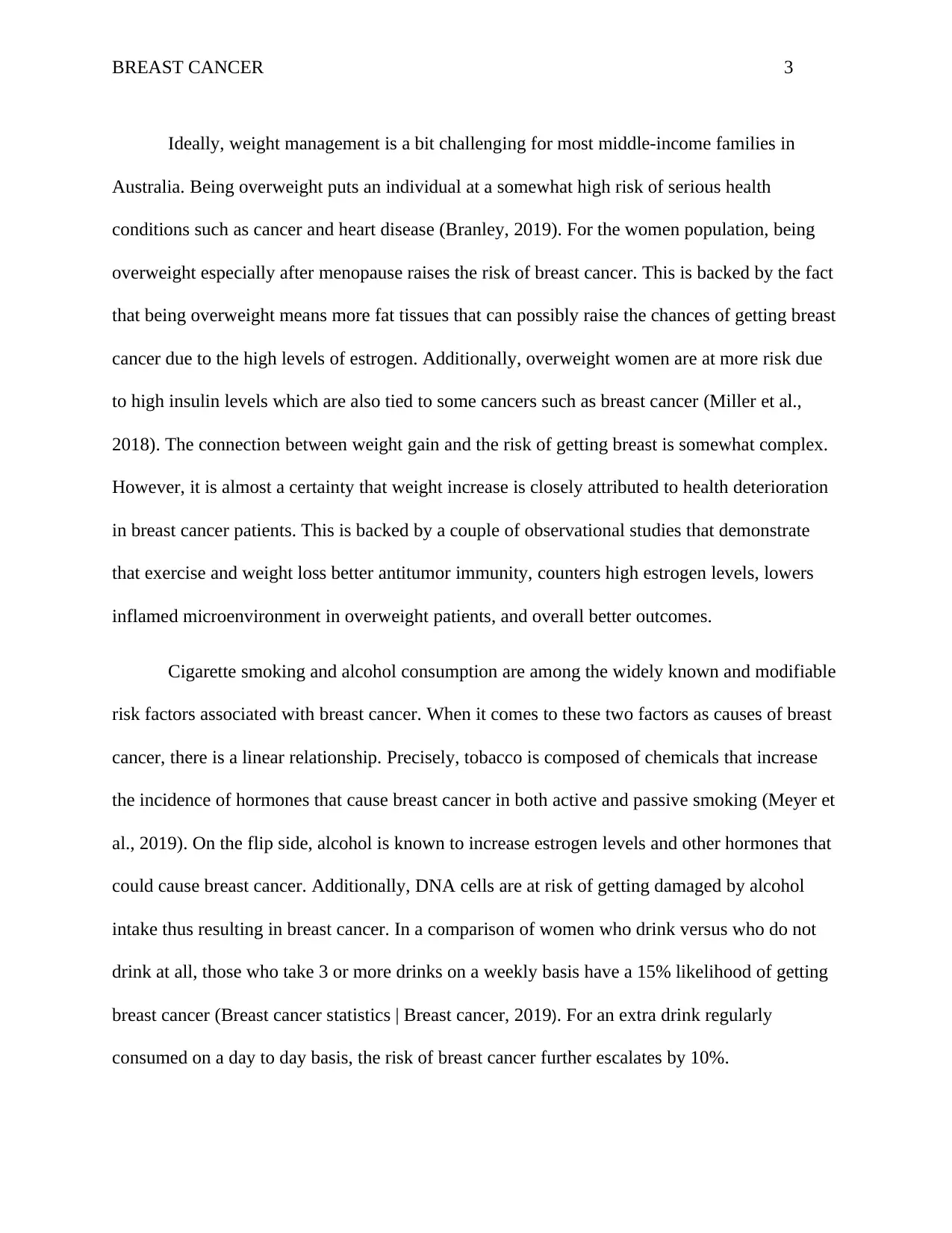
BREAST CANCER 3
Ideally, weight management is a bit challenging for most middle-income families in
Australia. Being overweight puts an individual at a somewhat high risk of serious health
conditions such as cancer and heart disease (Branley, 2019). For the women population, being
overweight especially after menopause raises the risk of breast cancer. This is backed by the fact
that being overweight means more fat tissues that can possibly raise the chances of getting breast
cancer due to the high levels of estrogen. Additionally, overweight women are at more risk due
to high insulin levels which are also tied to some cancers such as breast cancer (Miller et al.,
2018). The connection between weight gain and the risk of getting breast is somewhat complex.
However, it is almost a certainty that weight increase is closely attributed to health deterioration
in breast cancer patients. This is backed by a couple of observational studies that demonstrate
that exercise and weight loss better antitumor immunity, counters high estrogen levels, lowers
inflamed microenvironment in overweight patients, and overall better outcomes.
Cigarette smoking and alcohol consumption are among the widely known and modifiable
risk factors associated with breast cancer. When it comes to these two factors as causes of breast
cancer, there is a linear relationship. Precisely, tobacco is composed of chemicals that increase
the incidence of hormones that cause breast cancer in both active and passive smoking (Meyer et
al., 2019). On the flip side, alcohol is known to increase estrogen levels and other hormones that
could cause breast cancer. Additionally, DNA cells are at risk of getting damaged by alcohol
intake thus resulting in breast cancer. In a comparison of women who drink versus who do not
drink at all, those who take 3 or more drinks on a weekly basis have a 15% likelihood of getting
breast cancer (Breast cancer statistics | Breast cancer, 2019). For an extra drink regularly
consumed on a day to day basis, the risk of breast cancer further escalates by 10%.
Ideally, weight management is a bit challenging for most middle-income families in
Australia. Being overweight puts an individual at a somewhat high risk of serious health
conditions such as cancer and heart disease (Branley, 2019). For the women population, being
overweight especially after menopause raises the risk of breast cancer. This is backed by the fact
that being overweight means more fat tissues that can possibly raise the chances of getting breast
cancer due to the high levels of estrogen. Additionally, overweight women are at more risk due
to high insulin levels which are also tied to some cancers such as breast cancer (Miller et al.,
2018). The connection between weight gain and the risk of getting breast is somewhat complex.
However, it is almost a certainty that weight increase is closely attributed to health deterioration
in breast cancer patients. This is backed by a couple of observational studies that demonstrate
that exercise and weight loss better antitumor immunity, counters high estrogen levels, lowers
inflamed microenvironment in overweight patients, and overall better outcomes.
Cigarette smoking and alcohol consumption are among the widely known and modifiable
risk factors associated with breast cancer. When it comes to these two factors as causes of breast
cancer, there is a linear relationship. Precisely, tobacco is composed of chemicals that increase
the incidence of hormones that cause breast cancer in both active and passive smoking (Meyer et
al., 2019). On the flip side, alcohol is known to increase estrogen levels and other hormones that
could cause breast cancer. Additionally, DNA cells are at risk of getting damaged by alcohol
intake thus resulting in breast cancer. In a comparison of women who drink versus who do not
drink at all, those who take 3 or more drinks on a weekly basis have a 15% likelihood of getting
breast cancer (Breast cancer statistics | Breast cancer, 2019). For an extra drink regularly
consumed on a day to day basis, the risk of breast cancer further escalates by 10%.
⊘ This is a preview!⊘
Do you want full access?
Subscribe today to unlock all pages.

Trusted by 1+ million students worldwide
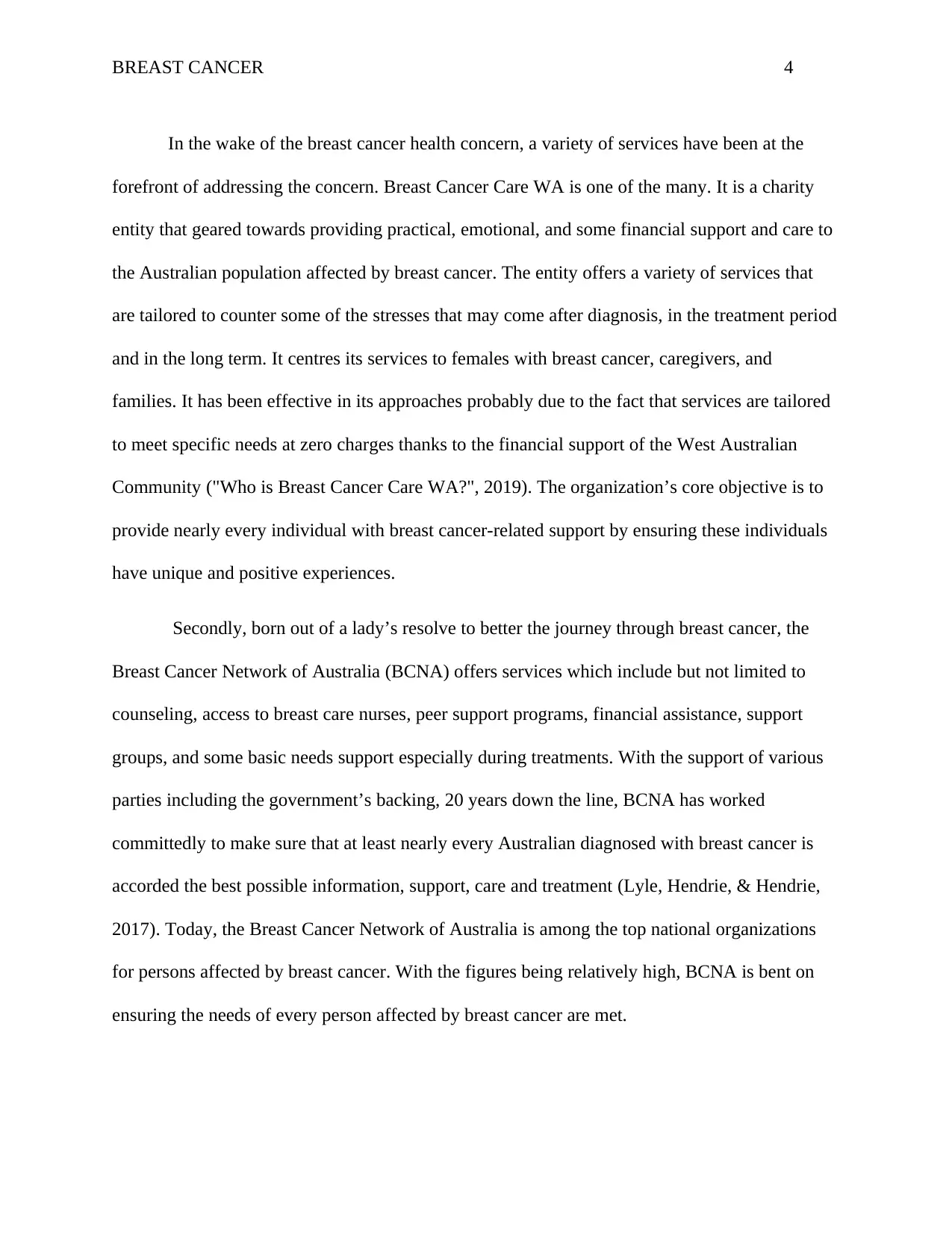
BREAST CANCER 4
In the wake of the breast cancer health concern, a variety of services have been at the
forefront of addressing the concern. Breast Cancer Care WA is one of the many. It is a charity
entity that geared towards providing practical, emotional, and some financial support and care to
the Australian population affected by breast cancer. The entity offers a variety of services that
are tailored to counter some of the stresses that may come after diagnosis, in the treatment period
and in the long term. It centres its services to females with breast cancer, caregivers, and
families. It has been effective in its approaches probably due to the fact that services are tailored
to meet specific needs at zero charges thanks to the financial support of the West Australian
Community ("Who is Breast Cancer Care WA?", 2019). The organization’s core objective is to
provide nearly every individual with breast cancer-related support by ensuring these individuals
have unique and positive experiences.
Secondly, born out of a lady’s resolve to better the journey through breast cancer, the
Breast Cancer Network of Australia (BCNA) offers services which include but not limited to
counseling, access to breast care nurses, peer support programs, financial assistance, support
groups, and some basic needs support especially during treatments. With the support of various
parties including the government’s backing, 20 years down the line, BCNA has worked
committedly to make sure that at least nearly every Australian diagnosed with breast cancer is
accorded the best possible information, support, care and treatment (Lyle, Hendrie, & Hendrie,
2017). Today, the Breast Cancer Network of Australia is among the top national organizations
for persons affected by breast cancer. With the figures being relatively high, BCNA is bent on
ensuring the needs of every person affected by breast cancer are met.
In the wake of the breast cancer health concern, a variety of services have been at the
forefront of addressing the concern. Breast Cancer Care WA is one of the many. It is a charity
entity that geared towards providing practical, emotional, and some financial support and care to
the Australian population affected by breast cancer. The entity offers a variety of services that
are tailored to counter some of the stresses that may come after diagnosis, in the treatment period
and in the long term. It centres its services to females with breast cancer, caregivers, and
families. It has been effective in its approaches probably due to the fact that services are tailored
to meet specific needs at zero charges thanks to the financial support of the West Australian
Community ("Who is Breast Cancer Care WA?", 2019). The organization’s core objective is to
provide nearly every individual with breast cancer-related support by ensuring these individuals
have unique and positive experiences.
Secondly, born out of a lady’s resolve to better the journey through breast cancer, the
Breast Cancer Network of Australia (BCNA) offers services which include but not limited to
counseling, access to breast care nurses, peer support programs, financial assistance, support
groups, and some basic needs support especially during treatments. With the support of various
parties including the government’s backing, 20 years down the line, BCNA has worked
committedly to make sure that at least nearly every Australian diagnosed with breast cancer is
accorded the best possible information, support, care and treatment (Lyle, Hendrie, & Hendrie,
2017). Today, the Breast Cancer Network of Australia is among the top national organizations
for persons affected by breast cancer. With the figures being relatively high, BCNA is bent on
ensuring the needs of every person affected by breast cancer are met.
Paraphrase This Document
Need a fresh take? Get an instant paraphrase of this document with our AI Paraphraser
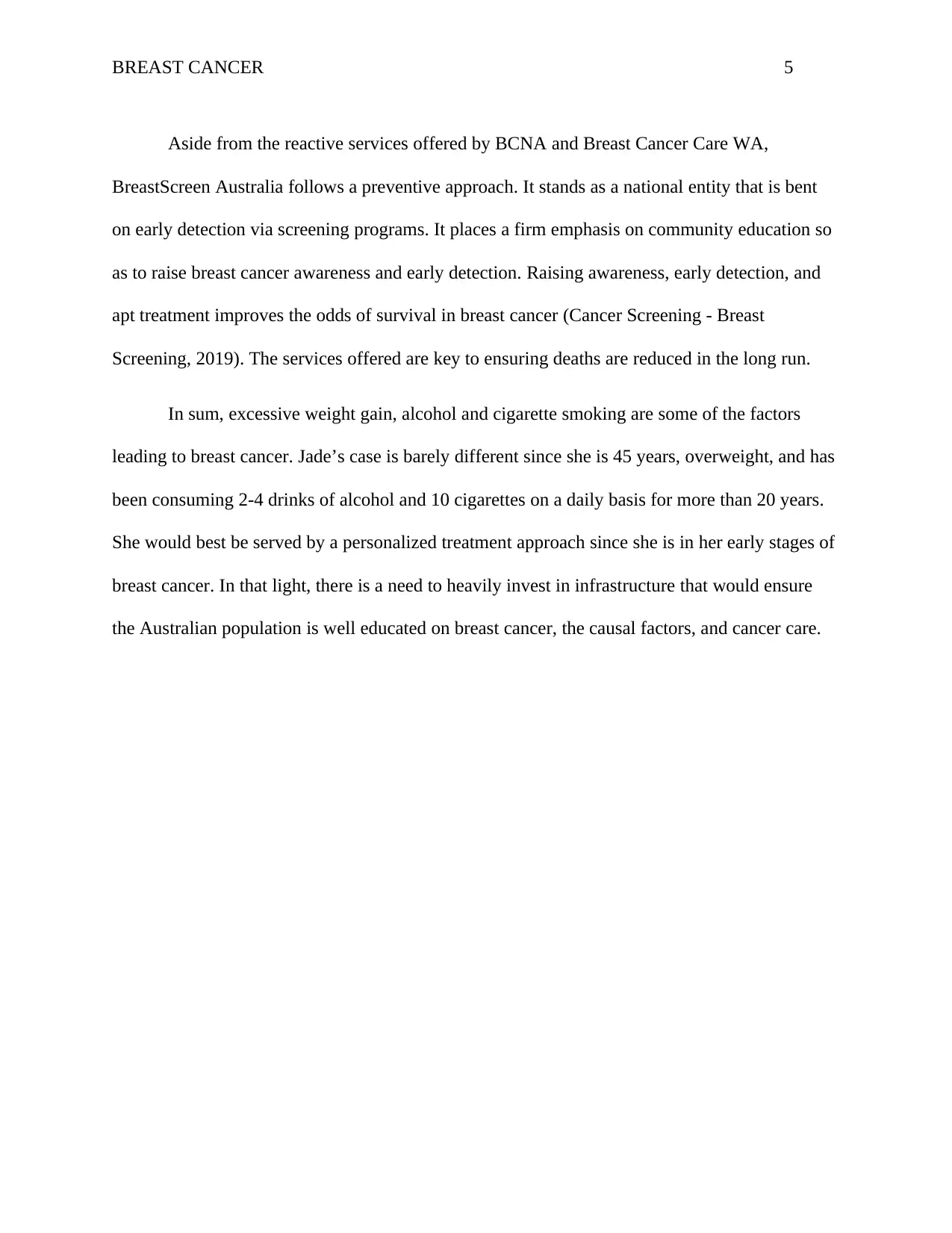
BREAST CANCER 5
Aside from the reactive services offered by BCNA and Breast Cancer Care WA,
BreastScreen Australia follows a preventive approach. It stands as a national entity that is bent
on early detection via screening programs. It places a firm emphasis on community education so
as to raise breast cancer awareness and early detection. Raising awareness, early detection, and
apt treatment improves the odds of survival in breast cancer (Cancer Screening - Breast
Screening, 2019). The services offered are key to ensuring deaths are reduced in the long run.
In sum, excessive weight gain, alcohol and cigarette smoking are some of the factors
leading to breast cancer. Jade’s case is barely different since she is 45 years, overweight, and has
been consuming 2-4 drinks of alcohol and 10 cigarettes on a daily basis for more than 20 years.
She would best be served by a personalized treatment approach since she is in her early stages of
breast cancer. In that light, there is a need to heavily invest in infrastructure that would ensure
the Australian population is well educated on breast cancer, the causal factors, and cancer care.
Aside from the reactive services offered by BCNA and Breast Cancer Care WA,
BreastScreen Australia follows a preventive approach. It stands as a national entity that is bent
on early detection via screening programs. It places a firm emphasis on community education so
as to raise breast cancer awareness and early detection. Raising awareness, early detection, and
apt treatment improves the odds of survival in breast cancer (Cancer Screening - Breast
Screening, 2019). The services offered are key to ensuring deaths are reduced in the long run.
In sum, excessive weight gain, alcohol and cigarette smoking are some of the factors
leading to breast cancer. Jade’s case is barely different since she is 45 years, overweight, and has
been consuming 2-4 drinks of alcohol and 10 cigarettes on a daily basis for more than 20 years.
She would best be served by a personalized treatment approach since she is in her early stages of
breast cancer. In that light, there is a need to heavily invest in infrastructure that would ensure
the Australian population is well educated on breast cancer, the causal factors, and cancer care.
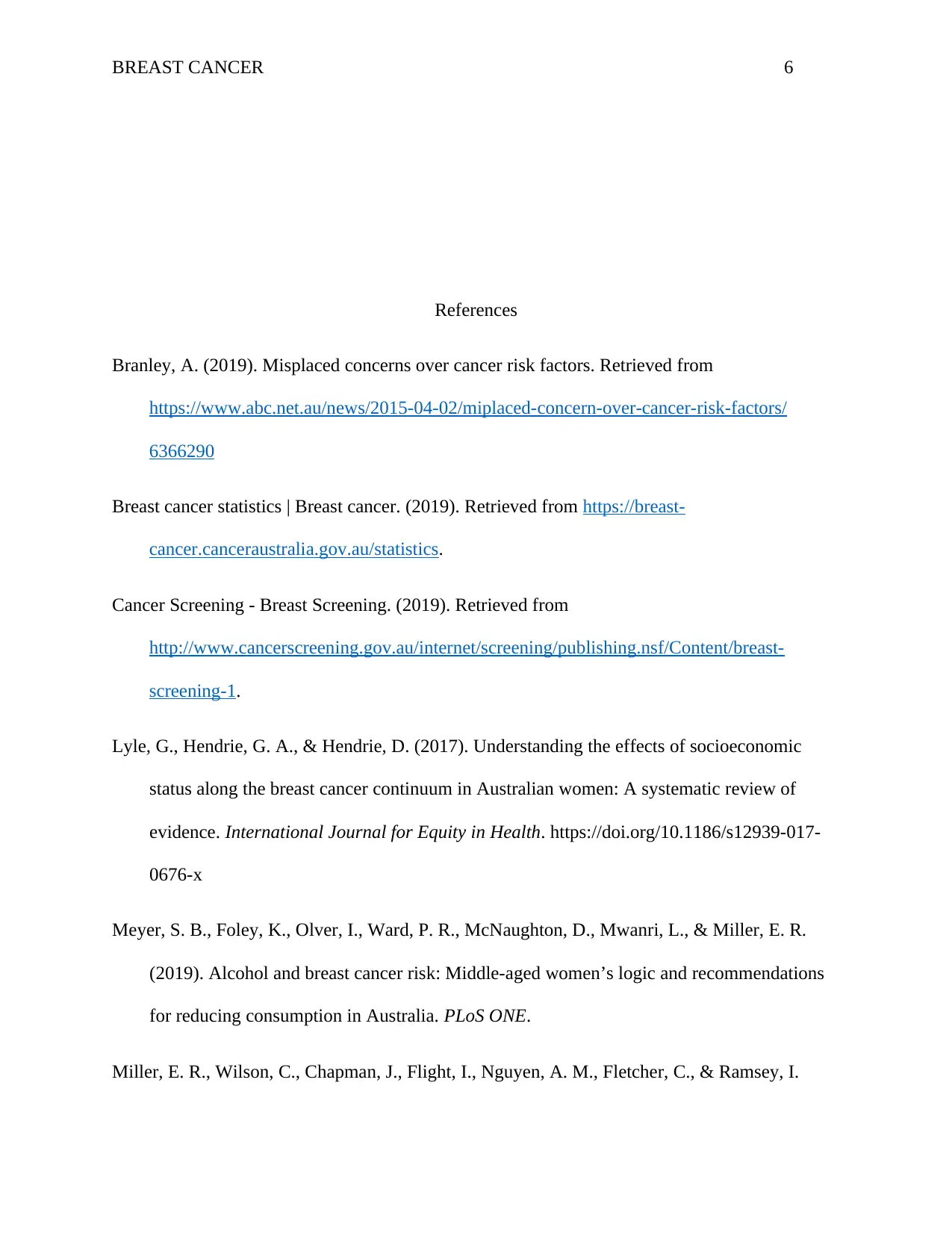
BREAST CANCER 6
References
Branley, A. (2019). Misplaced concerns over cancer risk factors. Retrieved from
https://www.abc.net.au/news/2015-04-02/miplaced-concern-over-cancer-risk-factors/
6366290
Breast cancer statistics | Breast cancer. (2019). Retrieved from https://breast-
cancer.canceraustralia.gov.au/statistics.
Cancer Screening - Breast Screening. (2019). Retrieved from
http://www.cancerscreening.gov.au/internet/screening/publishing.nsf/Content/breast-
screening-1.
Lyle, G., Hendrie, G. A., & Hendrie, D. (2017). Understanding the effects of socioeconomic
status along the breast cancer continuum in Australian women: A systematic review of
evidence. International Journal for Equity in Health. https://doi.org/10.1186/s12939-017-
0676-x
Meyer, S. B., Foley, K., Olver, I., Ward, P. R., McNaughton, D., Mwanri, L., & Miller, E. R.
(2019). Alcohol and breast cancer risk: Middle-aged women’s logic and recommendations
for reducing consumption in Australia. PLoS ONE.
Miller, E. R., Wilson, C., Chapman, J., Flight, I., Nguyen, A. M., Fletcher, C., & Ramsey, I.
References
Branley, A. (2019). Misplaced concerns over cancer risk factors. Retrieved from
https://www.abc.net.au/news/2015-04-02/miplaced-concern-over-cancer-risk-factors/
6366290
Breast cancer statistics | Breast cancer. (2019). Retrieved from https://breast-
cancer.canceraustralia.gov.au/statistics.
Cancer Screening - Breast Screening. (2019). Retrieved from
http://www.cancerscreening.gov.au/internet/screening/publishing.nsf/Content/breast-
screening-1.
Lyle, G., Hendrie, G. A., & Hendrie, D. (2017). Understanding the effects of socioeconomic
status along the breast cancer continuum in Australian women: A systematic review of
evidence. International Journal for Equity in Health. https://doi.org/10.1186/s12939-017-
0676-x
Meyer, S. B., Foley, K., Olver, I., Ward, P. R., McNaughton, D., Mwanri, L., & Miller, E. R.
(2019). Alcohol and breast cancer risk: Middle-aged women’s logic and recommendations
for reducing consumption in Australia. PLoS ONE.
Miller, E. R., Wilson, C., Chapman, J., Flight, I., Nguyen, A. M., Fletcher, C., & Ramsey, I.
⊘ This is a preview!⊘
Do you want full access?
Subscribe today to unlock all pages.

Trusted by 1+ million students worldwide
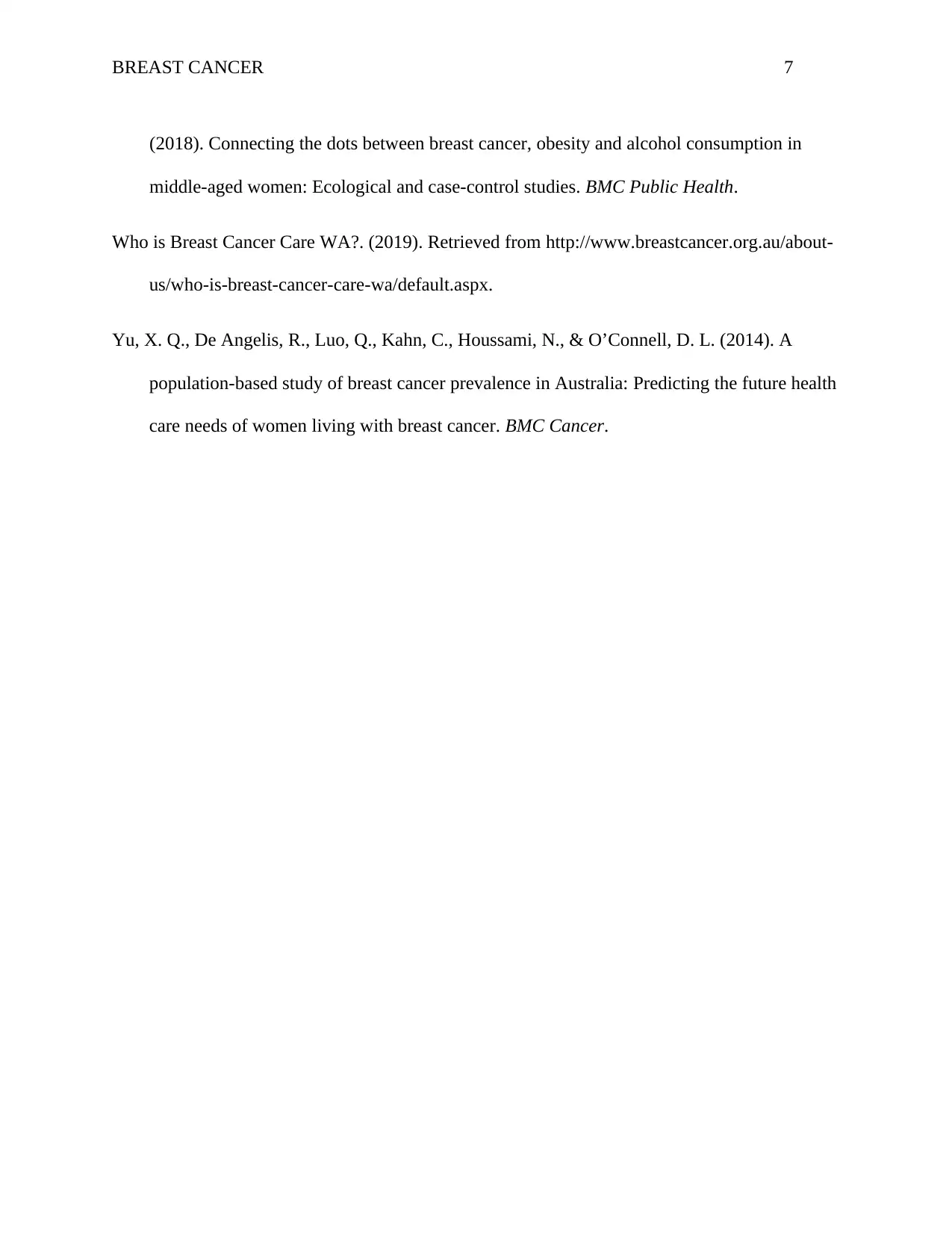
BREAST CANCER 7
(2018). Connecting the dots between breast cancer, obesity and alcohol consumption in
middle-aged women: Ecological and case-control studies. BMC Public Health.
Who is Breast Cancer Care WA?. (2019). Retrieved from http://www.breastcancer.org.au/about-
us/who-is-breast-cancer-care-wa/default.aspx.
Yu, X. Q., De Angelis, R., Luo, Q., Kahn, C., Houssami, N., & O’Connell, D. L. (2014). A
population-based study of breast cancer prevalence in Australia: Predicting the future health
care needs of women living with breast cancer. BMC Cancer.
(2018). Connecting the dots between breast cancer, obesity and alcohol consumption in
middle-aged women: Ecological and case-control studies. BMC Public Health.
Who is Breast Cancer Care WA?. (2019). Retrieved from http://www.breastcancer.org.au/about-
us/who-is-breast-cancer-care-wa/default.aspx.
Yu, X. Q., De Angelis, R., Luo, Q., Kahn, C., Houssami, N., & O’Connell, D. L. (2014). A
population-based study of breast cancer prevalence in Australia: Predicting the future health
care needs of women living with breast cancer. BMC Cancer.
1 out of 7
Related Documents
Your All-in-One AI-Powered Toolkit for Academic Success.
+13062052269
info@desklib.com
Available 24*7 on WhatsApp / Email
![[object Object]](/_next/static/media/star-bottom.7253800d.svg)
Unlock your academic potential
Copyright © 2020–2026 A2Z Services. All Rights Reserved. Developed and managed by ZUCOL.





